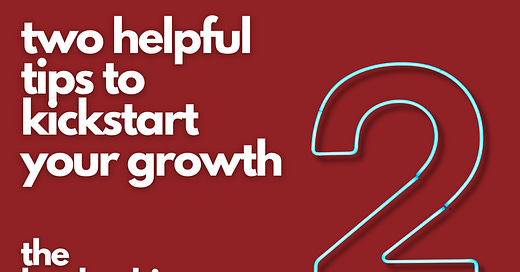Two Coaching Tips to Kickstart Your Growth
Apply these two techniques at the beginning, and the benefits accelerate
Quick note for The Leadership Club (TLC) Subscribers:
Upgraded Subscribers can access the Monday call details on the homepage (You’ll also get a reminder email 1 hour before the call.
Free subscribers: there’s still time to upgrade and join the coaching calls with a special Charter Member rate for the first year (normally $199).
Not sure if you’re ready to subscribe? Ask me about a 2-week free trial.
As we get ready for our first Coaching Call and begin our journey into growth, here are a few tips to get you started:
When you begin coaching, take two steps to accelerate your progress
1. Clarify Your Goals: Coaching is about YOU
Find a quiet time and place to ask yourself:
Who do you want to BECOME as a result of coaching?
Coaching isn’t about what you’ll “get.”
Coaching is about who you will “become.”
If you’re coaching to “get” more money, promotions, prestige, power or some other prize, take some time to consider your motivations. You can have all of those things now; so why don’t you? In my experience it’s because most people aren’t motivates by what they “get” as much as we think.
So what does motivate you to grow? A powerful opportunity.
To become the next best version of yourself
The most rewarding part of life is becoming the “next version” of ourselves. And leadership coaching helps you become the next, best leader you have dreamed of becoming. Who is that person? Say the following sentence out loud to yourself:
“The kind of person who……”
Now finish it any way you want.
“Becoming” through coaching - or training, reading, exercising, meditation - works if you’re focused on who you’ll become at the end of the journey.
That’s the source of unlimited motivation, energy and stamina to see it through. It’s exciting to see yourself approaching a new level of performance.
Do you wish to become a better communicator, thinker, listener, with more confidence?
Do you envision yourself in greater control of situations, emotions, challenges?
Can you become more comfortable with conflict, versatile handling change, and calm in the face of turbulent times?
There are lots of possibilities - and they all come back to you.
Don’t do coaching to “do something better.”
Do coaching to become someone better.
Try some techniques for clarifying your goals:
Envision yourself three months from now. How would you “know” you’re making progress in coaching? Write down those indicators.
Imagine a friend asks, “Why are you doing coaching?” What’s your answer? Say it in 10 words or less.
Imagine a satisfying day in the future. You write in your journal: “Today was the kind of day when….” How do you complete the phrase?
2. Establish Your Commitment (Plan)
Once you can envision a “better you,” ask yourself what you’ll need to get there. Certainly, more knowledge will help make it happen. But information is only half the equation. Anybody can learn new data, ideas and skills.
Only committed people apply them.
How committed are you to building and applying new knowledge? Some people coach specifically to increase that commitment. To learn how to “stick with it.”
First, clear up a misconception: You don’t become more committed because a coach “holds you accountable” with tracking, prizes or sour-faced scolding. Those things rarely work with adults: We’re too good at telling ourselves what someone else thinks doesn’t matter.
But what will you tell yourself a month or year from now, if you fail to become who you desire?
That’s all that really matters.
Holding yourself accountable.
Identify and strengthen commitment like this:
Think of a skill or behavior you possess that creates the biggest “impact” on your performance today. We call this your “high gain activity.” Pick something that delivers big returns for yourself and those you lead.
Write down the percentage of time you spend doing that high-gain activity now.
Write down the percentage of time you should be doing it to reach your next level of performance.
Reflect on the gap. What would you need to believe in order to take action to close the gap?
Now: How can you strengthen that belief?
That’s what will deepen your commitment. Improving your belief that taking that action is the path to your progress.
Not time. Not tasks. Not perfection.
You’ll only go as far as you believe you can go.
Commitment comes from belief, not accountability.
It’s helpful to track activities and progress. But accountability happens after the fact. It happens when you see the outcomes, not the busyness.
That’s why belief matters more than tracking.
Commitment happens here and now. Your belief in high gain activity drives your motivation - today, now, instead of wasting time doing anything else.
Combine your commitment with a clear picture of your future self and you’re setting yourself up for great success in your coaching experience -
By getting off to a strong start!




